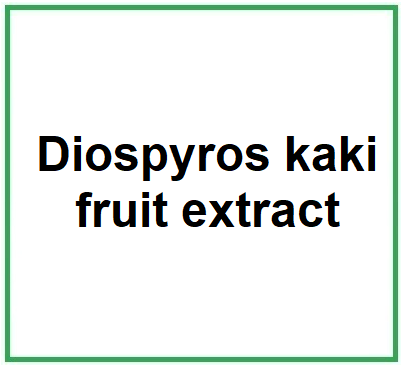Diospyros kaki fruit extract is a product of natural origin.
The name describes the structure of the molecule:
- Diospyros kaki is the scientific name for the persimmon fruit, known for its antioxidant properties. Extracts from this fruit are often used in skincare products for their nourishing and protective properties.
- fruit extract refers to the substance obtained from the persimmon fruit. These extracts are rich in vitamins, minerals, and other bioactive compounds that can help nourish and protect the skin.
Description of Raw Materials Used in the Production
Diospyros kaki fruit extract, also known as persimmon extract, is derived directly from the fruit of the persimmon
Functions of Raw Materials
Diospyros Kaki Fruit - Rich in nutrients, vitamins, and antioxidants, it is used for its beneficial properties in cosmetics and food
Extraction Process
- Harvesting - Persimmon fruits are harvested when ripe
- Cleaning - The fruits are cleaned to remove external impurities
- Extraction - The extract is obtained through extraction processes like pressing or solvent use
- Filtration - The extract is filtered to remove solid residues
- Concentration - The extract can be concentrated to increase its potency
- Stabilization - The extract is stabilized to ensure its preservation
Diospyros kaki fruit extract appears as a powder or yellowish liquid.

What it is for and where
Cosmetics
Skin conditioning agent. It is the mainstay of topical skin treatment as it has the function of restoring, increasing or improving skin tolerance to external factors, including melanocyte tolerance. The most important function of the conditioning agent is to prevent skin dehydration, but the subject is rather complex and involves emollients and humectants that can be added in the formulation.
Commercial applications:
Use in Cosmetics and Skin Care. This extract is rich in antioxidants and is used in skin care products for its anti-aging and moisturizing properties.
Antioxidant Benefits. Helps fight free radicals, helping to reduce signs of aging and improve skin health and appearance.
Hydration and Nutrition. Provides hydration benefits to the skin due to its vitamin- and mineral-rich composition.
Use in Sunscreen Products. It is sometimes included in sunscreen products for its protective properties against UV damage.
Studies
Diospyros kaki contains proanthocyanidins, carotenoids, flavonoids, proteins (1) and other components of interest to human health such as A, B6, B12, C and D (2).
References_____________________________________________________________________
(1) Direito R, Rocha J, Sepodes B, Eduardo-Figueira M. From Diospyros kaki L. (Persimmon) Phytochemical Profile and Health Impact to New Product Perspectives and Waste Valorization. Nutrients. 2021 Sep 20;13(9):3283. doi: 10.3390/nu13093283. PMID: 34579162; PMCID: PMC8465508.
Abstract. Persimmon (Diospyros kaki L.) fruit's phytochemical profile includes carotenoids, proanthocyanidins, and gallic acid among other phenolic compounds and vitamins. A huge antioxidant potential is present given this richness in antioxidant compounds. These bioactive compounds impact on health benefits. The intersection of nutrition and sustainability, the key idea behind the EAT-Lancet Commission, which could improve human health and decrease the global impact of food-related health conditions such as cancer, heart disease, diabetes, and obesity, bring the discussion regarding persimmon beyond the health effects from its consumption, but also on the valorization of a very perishable food that spoils quickly. A broad option of edible products with better storage stability or solutions that apply persimmon and its byproducts in the reinvention of old products or even creating new products, or with new and better packaging for the preservation of food products with postharvest technologies to preserve and extend the shelf-life of persimmon food products. Facing a global food crisis and the climate emergency, new and better day-to-day solutions are needed right now. Therefore, the use of persimmon waste has also been discussed as a good solution to produce biofuel, eco-friendly alternative reductants for fabric dyes, green plant growth regulator, biodegradable and edible films for vegetable packaging, antimicrobial activity against foodborne methicillin-resistant Staphylococcus aureus found in retail pork, anti-Helicobacter pylori agents from pedicel extracts, and persimmon pectin-based emulsifiers to prevent lipid peroxidation, among other solutions presented in the revised literature. It has become clear that the uses for persimmon go far beyond the kitchen table and the health impact consumption demonstrated over the years. The desired sustainable transition is already in progress, however, mechanistic studies and clinical trials are essential and scaling-up is fundamental to the future.
(2) Santos ADDC, Fonseca FA, Dutra LM, Santos MFC, Menezes LRA, Campos FR, Nagata N, Ayub R, Barison A. 1H HR-MAS NMR-based metabolomics study of different persimmon cultivars (Diospyros kaki) during fruit development. Food Chem. 2018 Jan 15;239:511-519. doi: 10.1016/j.foodchem.2017.06.133.
![]() Diospyros kaki fruit extract
Diospyros kaki fruit extract 


